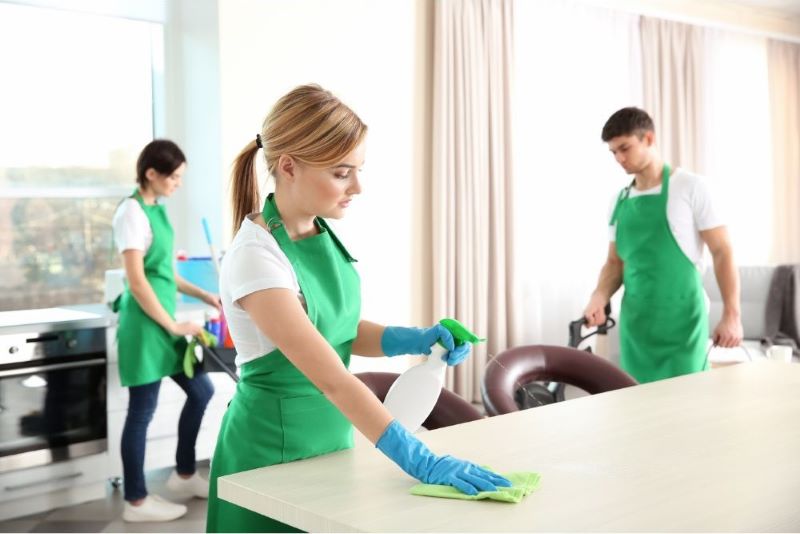In today’s world, where environmental concerns are at the forefront of global discussions, transforming your home into an eco-friendly sanctuary not only aligns with sustainable living principles but also improves your overall well-being. More people are turning to natural alternatives for cleaning and reducing their carbon footprint. An eco-friendly home is not just about cutting down on plastic waste or reducing energy consumption; it also involves adopting smart cleaning habits that minimize the use of harmful chemicals while keeping your home pristine and inviting. In this article, we will explore how to improve your home with eco-friendly cleaning solutions and hacks that are both effective and mindful of the environment.
1. The Importance of Eco-Friendly Cleaning
Traditional cleaning products, while often effective, are loaded with chemicals that can be harmful to both your health and the planet. Many commercial cleaning products contain synthetic fragrances, chlorine bleach, ammonia, and phthalates, which can contribute to indoor air pollution, skin irritation, and respiratory issues. Furthermore, many of these products come in single-use plastic packaging, which adds to the growing landfill crisis.
Eco-friendly cleaning practices, on the other hand, use natural ingredients that are non-toxic, biodegradable, and sustainable. By opting for green cleaning solutions, you reduce the amount of harmful chemicals in your home and the environment. These eco-friendly alternatives are just as effective, if not more so, than their commercial counterparts, and often cost less to use over time.
2. Eco-Friendly Cleaning Ingredients
To create a truly eco-friendly home, the foundation lies in the cleaning products you choose. Rather than purchasing store-bought solutions laden with chemicals, you can make your own effective cleaning agents using common household items. Here are some of the most popular and eco-friendly ingredients:
A. Baking Soda
Baking soda is a versatile, non-toxic, and biodegradable ingredient that can be used in a multitude of ways for cleaning. Its natural abrasiveness makes it perfect for scrubbing stubborn stains, deodorizing carpets, and cleaning kitchen sinks. It also neutralizes odors, making it an excellent option for refreshing trash cans or eliminating smells in the fridge.
B. Vinegar
White vinegar is another powerhouse of eco-friendly cleaning. It can dissolve mineral deposits, grease, and grime, and also has natural antibacterial properties. A mixture of equal parts vinegar and water can clean windows, countertops, and floors, leaving them streak-free and gleaming. It’s also a natural fabric softener and can be used in laundry to soften clothes without the use of harsh chemicals.
C. Lemon
Lemon juice is not only a refreshing addition to your diet but also a natural cleaner that packs a punch. Its acidity makes it effective for cutting through grease, removing stains, and acting as a disinfectant. Lemon can also freshen up surfaces and eliminate unpleasant odors. Combined with baking soda, lemon creates a powerful paste for scrubbing bathroom tiles or cleaning kitchen surfaces.
D. Castile Soap
Castile soap, made from plant-based oils, is gentle on the environment and effective for cleaning. It can be used for a variety of tasks, from cleaning floors and dishes to washing hands and even body care. It’s biodegradable and doesn’t leave harmful residues, making it a popular choice for eco-conscious households.
3. Eco-Friendly Cleaning Hacks for a Healthier Home
Now that we’ve established a foundation with eco-friendly cleaning ingredients, here are some simple yet effective cleaning hacks that will help you maintain a healthy, green home while saving time and effort.
A. Homemade All-Purpose Cleaner
Creating a versatile all-purpose cleaner is one of the easiest eco-friendly hacks. Simply mix one cup of distilled white vinegar, one cup of water, and about 10-20 drops of essential oils (such as lavender or tea tree) for a fresh, fragrant solution. This mixture works wonders on countertops, sinks, bathroom surfaces, and even floors. You can store it in a spray bottle for easy access and use it for everyday cleaning.
B. Clean Your Oven with Baking Soda
Ovens can accumulate grease and grime over time, but commercial oven cleaners are often laden with harsh chemicals. Instead, you can use a baking soda paste to clean your oven naturally. Simply make a thick paste by mixing baking soda and water, apply it to the inside of your oven, and let it sit overnight. The next day, use a damp cloth to wipe away the paste, and any built-up grime will come off effortlessly. This method is not only eco-friendly but also safer for your kitchen environment.
C. Remove Hard Water Stains with Vinegar
Hard water stains on faucets, showerheads, and tiles can be a hassle to clean. However, vinegar’s acidity is excellent for breaking down mineral deposits. Soak a cloth in white vinegar and wrap it around affected areas like faucets or showerheads, leaving it for about 30 minutes to an hour. Once removed, scrub away the stains with a sponge, and rinse thoroughly. This method not only works wonders on hard water stains but also eliminates the need for chemical-based cleaners.
D. Refresh Carpets with Baking Soda
Instead of using a store-bought carpet deodorizer that’s loaded with chemicals, you can create your own natural version with baking soda. Simply sprinkle baking soda liberally over your carpets, let it sit for 15-20 minutes, and then vacuum it up. Baking soda absorbs odors and leaves your carpets smelling fresh without any synthetic fragrances or harmful chemicals.
E. Clean Windows with Vinegar and Water
Streaky windows are a common problem with traditional glass cleaners, but vinegar provides an eco-friendly and streak-free alternative. Mix equal parts white vinegar and water in a spray bottle, and use a microfiber cloth to wipe down the glass. This solution is safe for both the environment and your indoor air quality, and it will leave your windows sparkling clear.
F. Natural Disinfectant with Essential Oils
Essential oils, such as tea tree, eucalyptus, and lavender, are known for their natural antibacterial and antifungal properties. Adding a few drops to your homemade cleaners not only imparts a pleasant fragrance but also enhances the disinfectant qualities of your solution. For example, a few drops of tea tree oil in your all-purpose cleaner or in the laundry can kill germs and bacteria, promoting a healthier home.
G. Laundry with Eco-Friendly Alternatives
Traditional laundry detergents often contain synthetic fragrances, phosphates, and other harsh chemicals that can contribute to water pollution. To make your laundry more eco-friendly, consider switching to natural laundry detergents, or even making your own with ingredients like castile soap, baking soda, and essential oils. Another trick is to use vinegar as a natural fabric softener to soften clothes without chemicals.
4. Eco-Friendly Home Maintenance Tips
Cleaning your home eco-friendly isn’t limited to just the products you use. Your home maintenance practices can also be adjusted to be more sustainable. Here are some additional tips:
A. Reduce Plastic Waste
Consider swapping out disposable cleaning wipes and paper towels for washable, reusable cloths or microfiber towels. These options not only save money over time but also reduce the amount of plastic waste in landfills. For bigger jobs, like mopping, invest in a reusable mop with washable pads.
B. Use Natural Air Fresheners
Rather than purchasing artificial air fresheners, which are often laden with chemicals, consider using natural alternatives. Essential oils, beeswax candles, or air-purifying plants (like snake plants and peace lilies) can help purify the air in your home while providing a subtle, refreshing scent.
C. Maximize Natural Light
Reducing your reliance on artificial lighting can significantly cut down on energy consumption. Maximize natural light by keeping windows clean and unblocked. Not only will this lower your electricity bill, but it will also create a brighter, more uplifting atmosphere inside your home.
5. Conclusion: Eco-Friendly Cleaning for a Greener, Healthier Home
By adopting eco-friendly cleaning practices and clever hacks, you can improve your home while protecting the environment. Simple changes, such as replacing chemical-laden cleaners with natural alternatives, using reusable tools, and embracing sustainable home maintenance habits, can have a significant positive impact on your overall health and the planet’s well-being. Creating an eco-friendly home is not a daunting task—it’s about making small, thoughtful choices that add up over time.
When you make the shift to using natural, biodegradable ingredients and non-toxic cleaning solutions, you are not only creating a safer and healthier living environment for you and your loved ones but also contributing to a more sustainable future. So, gather your eco-friendly ingredients, try these cleaning hacks, and transform your home into a place that reflects your commitment to both cleanliness and environmental responsibility.

